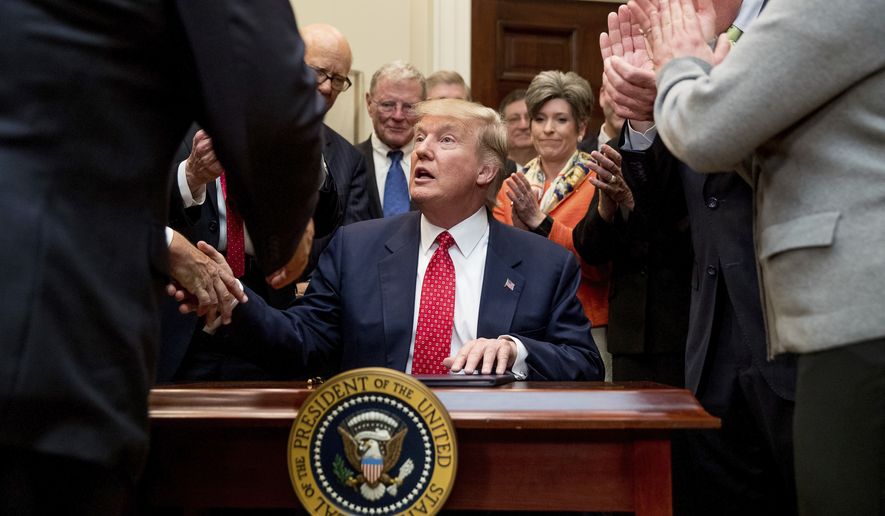The Trump administration finalized Thursday its replacement for the Waters of the United States rule, eliminating the federal government’s role in regulating the stock ponds, irrigation ditches and seasonal streams encompassed under the broad Obama-era regulations.
The Navigable Waters Protection Rule, which takes effect in 60 days, strikes the “proper balance between Washington and the states” while providing “clarity and certainty for the regulatory community and protecting the environment,” said Environmental Protection Agency Administrator Andrew Wheeler.
“Today, thanks to our new rule, our nation’s farmers, ranchers, developers, manufacturers and other landowners can finally focus on providing the food, shelter and other commodities that Americans rely on every day, instead of spending tens of thousands of dollars on attorneys and consultants to determine whether waters on their own land fall under the control of the federal government,” Mr. Wheeler said on a press call.
In September, the Trump administration repealed the WOTUS rule, also known as the Clean Water Rule, amid a court fight the saw a federal court issued a stay in 2015, hours before the regulations were scheduled to take effect, in the 13 states that had challenged them in court.
The Obama administration rule, which broadened the scope of the 1972 Clean Water Act, drew complaints from farmers and ranchers who said it forced them to hire experts to determine whether bodies of water that constitute little more than puddles were covered by the federal regulations.
The newly released rule defines four types of hydrological features for federal jurisdiction — territorial seas and navigable waters; tributaries; lakes and ponds, and adjacent wetlands — and lists 12 types of waters excluded from the rule, including groundwater, ephemeral pools and stormwater runoff.
Today at @NAHB, I along with @asacivilworks was proud to unveil the new Navigable Waters Protection Rule (#NWPR) implementing the original intent of congress and the #CleanWater Act while respecting the rights of states and tribes, ending decades of regulatory uncertainty. #WOTUS pic.twitter.com/shVcYqOmsN
— EPA Administrator Andrew Wheeler (@EPAAWheeler) January 23, 2020
David Ross, EPA Office of Water assistant administrator, said that the rule takes into account the role played by states and tribes by drawing a clear line between waters under their jurisdiction and “core waters the federal government should and must regulate.”
“This isn’t the 1970s and 80s,” Mr. Ross said. “The states have robust environmental programs. They value and cherish their resources. This is not a rule that presumes if the federal government doesn’t regulate, there is no regulation. That has been a fault of the former administrations, and it is simply not true.”
Environmental groups promptly blasted the regulatory do-over, dubbing it the “Dirty Water Rule” and vowing to take their complaints to Congress.
“With the Dirty Water Rule, the administration has put the interests of polluters over those of the public and our drinking water,” said John Rumpler, Environment America program director.
WildEarth Guardians accused the administration of eliminating “vital clean water protections from 60 percent of rivers, creeks, streams and wetlands across the United States” by eradicating “entire categories of previously protected streams.”
“River basins are like trees, you can’t put poison at the base of a tree and not expect it to destroy the trunk and leaves,” said Jen Pelz, WildEarthGuardians Rio Grande waterkeeper and rivers program director. “It defies common sense to leave unprotected the arteries of life to the desert Southwest.”
Meanwhile, farmers, ranchers and energy officials praised the rule, which was unveiled at the National Association of Home Builders show in Las Vegas.
“It provides clarity and certainty, allowing farmers to understand water regulations without having to hire teams of consultants and lawyers,” said American Farm Bureau Federation President Zippy Duvall. “We appreciate the commitment of the agencies involved and this administration to crafting a new regulation that achieves important regulatory oversight while allowing farmers to farm. Clean water, clear rules.”
Thomas Pyle, president of the American Energy Alliance, said that Mr. Trump “made good on another important promise by replacing a federal regulation that was considered by many experts as an unprecedented attack on the private property rights of rural Americans.”
“The Obama WOTUS rule would have unnecessarily harmed America’s farmers, ranchers and energy producers with no meaningful environmental benefit,” Mr. Pyle said.
R.D. James, assistant secretary of the Army for Civil Works, said he experienced confusion himself over federal water rules himself during his 48 years as a farmer and also as a member of the Mississippi River Commission.
“There is nowhere I would rather be today than here having signed the new rule with you,” Mr. James told Mr. Wheeler. “This is one of the most important things that I have witnessed in my lifetime … I’m very proud to be part of this rule and I think America will prosper and appreciate this rule once it hits the streets.”
• Valerie Richardson can be reached at vrichardson@washingtontimes.com.




Please read our comment policy before commenting.